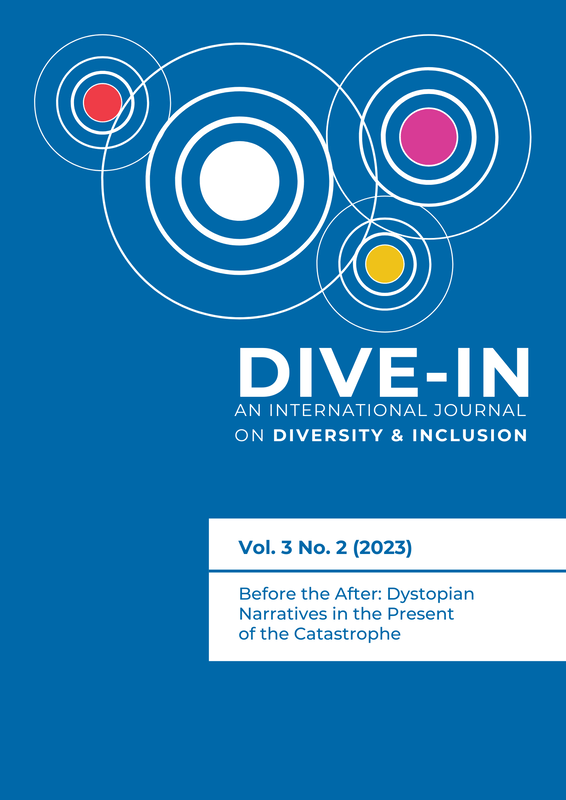Il Dominio della Macchina: dagli scenari ipotetici di Erewhon alla realtà delle piattaforme digitali di The Circle
DOI:
https://doi.org/10.6092/issn.2785-3233/19133Keywords:
dystopia, machine evolution, social networks, Butler, EggersAbstract
Throughout dystopian literature it is possible to identify meditations and anxieties concerning the relationship between Man and the Machine along with its present and future developments. In a globalised world, dominated by the digital sphere and, maybe, on the verge of giving rise to artificial intelligence, the present article aims to retrace the evolution of these concerns throughout dystopian literature, putting them in relation with recent technological developments. It will focus specifically on four works: Samuel Butler’s Erewhon (1872), E.M. Forster’s The Machine Stops (1911), Michael Frayn’s A Very Private Life (1968) and Dave Eggers’s The Circle (2013). Each has addressed Man’s dependence on the Machine and its eventual takeover, starting from Butler’s philosophical and speculative considerations and moving on to more concrete scenarios in which the relationship between Man and Machine has acquired the shape of the social and technological landscape we inhabit.
References
Allen, Mike. 2017. “Sean Parker unloads on Facebook: “God only knows what it’s doing to our children’s brains”. Axios, 9 novembre 2017, https://www.axios.com/2017/12/15/sean-parker-unloads-on-facebook-god-only-knows-what-its-doing-to-our-childrens-brains-1513306792 [ultimo accesso 28/01/2024].
Butler, Samuel. 1965 (1872). Erewhon. Trad. L. Drudi Demby. Milano: Adelphi.
Butler, Samuel. 2017 (1872). Erewhon (A Dystopia): The Masterpiece that Inspired Orwell's 1984 by Predicting the Takeover of Humanity by AI Machines. Chicago: OK Publishing (Edizione Kindle).
Claeys, Gregory. 2017. Dystopia: A Natural History: of modern despotism, its antecedents, and its literary diffractions. New York: Oxford University Press.
Chan, Rosaline. 2019. “The Cambridge Analytica whistleblower explains how the firm used Facebook data to sway elections”. Business Insider, 5 ottobre 2019, https://www.businessinsider.com/cambridge-analytica-whistleblower-christopher-wylie-facebook-data-2019-10?r=US&IR=T [ultimo accesso 28/01/2024]
Eggers, Dave. 2013. The Circle: A novel. London: Penguin.
Frayn, Michael. 2015 (1968). A Very Private Life. London: Faber & Faber.
Forster, E.M. 2011 (1911). The Machine Stops. London: Penguin Classics.
Grigenti, Fabio. 2021. Le macchine e il pensiero. Napoli, Salerno: Orthotes.
Han, Byung-Chul. 2016. Psicopolitica. Il neoliberalismo e le nuove tecniche del potere. Trad. F. Buongiorno. Roma: Nottetempo.
Lovink, Geert. 2019. Sad by Design. On platform nihilism. London: Pluto.
Herbert, Frank. 2021 (1965). Dune. New York: Ace.
Orwell, George. 2021a (1945). La fattoria degli animali. Trad. V. Latronico. Firenze: Giunti Editore.
Orwell, George. 2021b (1949). 1984. Milano: Giunti.
McLuhan, Marshall. 2015 (1964). Gli strumenti del comunicare. Trad. E. Capriolo. Milano: Il Saggiatore.
Ulam, Stanislaw. 1958. “Tribute to John von Neumann”. Bulletin of the American Mathematical Society 64, 1–49, https://www.ams.org/journals/bull/1958-64-03/S0002-9904-1958-10189-5/S0002-9904-1958-10189-5.pdf [ultimo accesso 28/01/2024]
Vinge, Vernor. 1993. “The Coming Technological Singularity: How to Survive in the Post-Human World”. Vision-21: Interdisciplinary Science and Engineering in the Era of Cyberspace Symposium, https://mindstalk.net/vinge/vinge-sing.html, [ultimo accesso 28/01/2024]
Zamjatin, Evgenij. 2013 (1923). Noi. Trad. A. Niero. Roma: Voland.
Downloads
Published
How to Cite
Issue
Section
License
Copyright (c) 2023 Robin Libero Carbonara

This work is licensed under a Creative Commons Attribution 4.0 International License.





